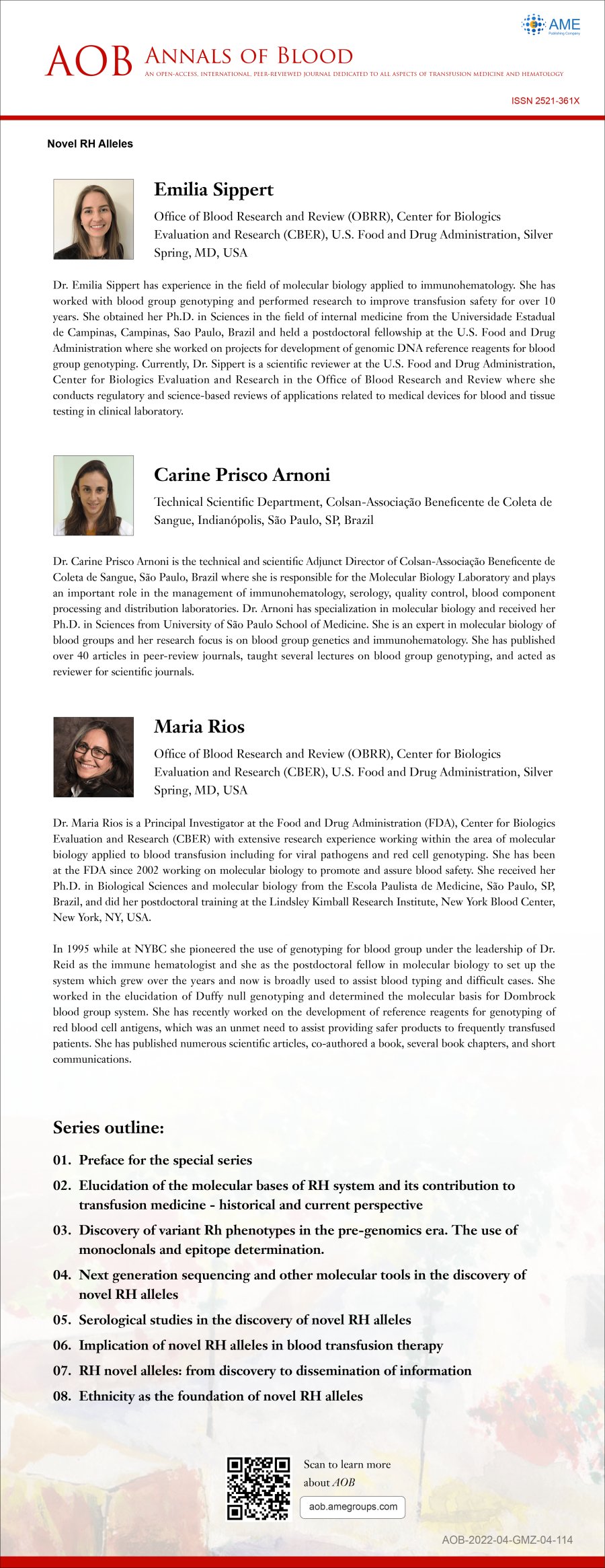
This series on “Novel RH Alleles” is edited by Dr. Emilia Sippert from U.S. Food and Drug Administration (USA), Dr. Carine Prisco Arnoni from Colsan-Associação Beneficente de Coleta de Sangue (Brazil) and Dr. Maria Rios from U.S. Food and Drug Administration (USA).
Emilia Sippert
Office of Blood Research and Review (OBRR), Center for Biologics Evaluation and Research (CBER), U.S. Food and Drug Administration, Silver Spring, MD, USA
Dr. Emilia Sippert has experience in the field of molecular biology applied to immunohematology. She has worked with blood group genotyping and performed research to improve transfusion safety for over 10 years. She obtained her Ph.D. in Sciences in the field of internal medicine from the Universidade Estadual de Campinas, Campinas, Sao Paulo, Brazil and held a postdoctoral fellowship at the U.S. Food and Drug Administration where she worked on projects for development of genomic DNA reference reagents for blood group genotyping. Currently, Dr. Sippert is a scientific reviewer at the U.S. Food and Drug Administration, Center for Biologics Evaluation and Research in the Office of Blood Research and Review where she conducts regulatory and science-based reviews of applications related to medical devices for blood and tissue testing in clinical laboratory.
Carine Prisco Arnoni
Technical Scientific Department, Colsan-Associação Beneficente de Coleta de Sangue, Indianópolis, São Paulo, SP, Brazil
Dr. Carine Prisco Arnoni is the technical and scientific Adjunct Director of Colsan-Associação Beneficente de Coleta de Sangue, São Paulo, Brazil where she is responsible for the Molecular Biology Laboratory and plays an important role in the management of immunohematology, serology, quality control, blood component processing and distribution laboratories. Dr. Arnoni has specialization in molecular biology and received her Ph.D. in Sciences from University of São Paulo School of Medicine. She is an expert in molecular biology of blood groups and her research focus is on blood group genetics and immunohematology. She has published over 40 articles in peer-review journals, taught several lectures on blood group genotyping, and acted as reviewer for scientific journals.
Maria Rios
Office of Blood Research and Review (OBRR), Center for Biologics Evaluation and Research (CBER), U.S. Food and Drug Administration, Silver Spring, MD, USA
Dr. Maria Rios is a Principal Investigator at the Food and Drug Administration (FDA), Center for Biologics Evaluation and Research (CBER) with extensive research experience working within the area of molecular biology applied to blood transfusion including for viral pathogens and red cell genotyping. She has been at the FDA since 2002 working on molecular biology to promote and assure blood safety. She received her Ph.D. in Biological Sciences and molecular biology from the Escola Paulista de Medicine, São Paulo, SP, Brazil, and did her postdoctoral training at the Lindsley Kimball Research Institute, New York Blood Center, New York, NY, USA.
In 1995 while at NYBC she pioneered the use of genotyping for blood group under the leadership of Dr. Reid as the immune hematologist and she as the postdoctoral fellow in molecular biology to set up the system which grew over the years and now is broadly used to assist blood typing and difficult cases. She worked in the elucidation of Duffy null genotyping and determined the molecular basis for Dombrock blood group system. She has recently worked on the development of reference reagents for genotyping of red blood cell antigens, which was an unmet need to assist providing safer products to frequently transfused patients. She has published numerous scientific articles, co-authored a book, several book chapters, and short communications.
Series outline:
- Preface for the special series
- Elucidation of the molecular bases of RH system and its contribution to transfusion medicine - historical and current perspective
- Discovery of variant Rh phenotypes in the pre-genomics era. The use of monoclonals and epitope determination.
- Next generation sequencing and other molecular tools in the discovery of novel RH alleles
- Serological studies in the discovery of novel RH alleles
- Implication of novel RH alleles in blood transfusion therapy
- RH novel alleles: from discovery to dissemination of information
- Ethnicity as the foundation of novel RH alleles
Disclosure:
The special series “Novel RH Alleles” was commissioned by the editorial office, Annals of Blood without any funding or sponsorship. Emilia Sippert, Carine Prisco Arnoni and Maria Rios are serving as the unpaid Guest Editors for the special series.
